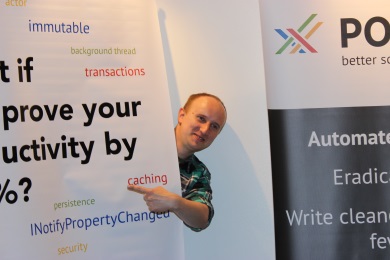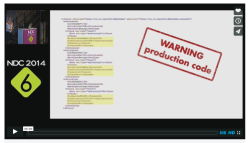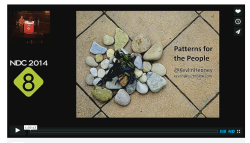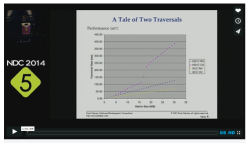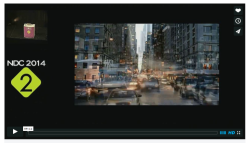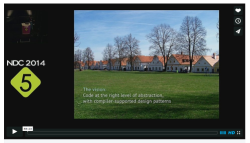Besides the great interactions, we also had a chance to see and get inspired by the amazing speakers and their talks. Here are some of those that you should certainly check out:
Code that Fits Your Brain by Adam Tornhill
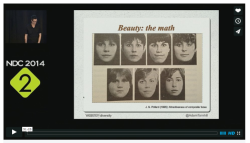 An original take on how the
code we
write correlates with the way our brains work. Looking at the various programming languages you will see both some
problematic constructs causing cognitive costs, and some successful ideas that help the code fit the human way of
thinking. Especially relevant for us are the sections of the talk dedicated to working memory and representation: our
brains tend to see the problems we solve in terms of patterns, while the most popular programming languages still do
not allow us to write the code on the same level of abstraction on which we reason about the given problem.
An original take on how the
code we
write correlates with the way our brains work. Looking at the various programming languages you will see both some
problematic constructs causing cognitive costs, and some successful ideas that help the code fit the human way of
thinking. Especially relevant for us are the sections of the talk dedicated to working memory and representation: our
brains tend to see the problems we solve in terms of patterns, while the most popular programming languages still do
not allow us to write the code on the same level of abstraction on which we reason about the given problem.
Watch on Vimeo.
The Integrations We Fear and How We Can Manage Them by Karoline Klever
Integrating your project with a 3rd-party API can often become a painful experience and involves a number of risks.
Karoline explains what these risks are and describes the steps you can take to defend your project from the low
quality and unreliability of 3rd-party vendors. Use of the right tools is important to efficiently deal with the
integration problems, and PostSharp comes to help when Karoline needs to add logging across her integration
code.
Watch on Vimeo.
Patterns for the People by Kevlin Henney
Most people think they understand patterns because they know Singleton and went through the GoF required reading.
Kevlin goes deeper; he debunks frequent misconceptions with strong arguments and beautiful slides, and make patterns
alive. We built PostSharp to help coding with patterns at implementation stage and Kevlin was one of those whose books
helped us building our vision.
Watch on Vimeo.
CPU Caches and Why You Care by Scott Meyers
Most of the programmers these days are working primarily with high-level languages. Spending so much time at the high
level may give you an illusion that you’re well-guarded from the intricacies of the underlying hardware. Scott
successfully dispels this illusion, by showing how performance of the high level code can suffer a lot if it
doesn’t fit well with the caching model of the underlying CPU. You will learn a number of techniques allowing
your code to make better use of different CPU cache types. PostSharp processes hundreds of thousands of instructions
per second so performance is very relevant to us.
Watch on
Vimeo.
Becoming an Outlier: Career Reboot for the Developer Mind by Cory House
One of the most inspirational talks of the whole conference. Cory reminds us just how important it is to spend our
time on things we actually love doing. He also gives advice on how to take your programming career to the next level,
become more satisfied with your job and make a bigger impact through your work.
Watch on Vimeo.
Taking Design Patterns to the Next Level by Gael Fraiteur
Last but not least, the presentation by our very own Gael Fraiteur. Patterns are essential to the way we human reason
and communicate about the world. Although patterns are intimately married to natural languages, they did not make
their way to programming languages. Gael shows how pattern thinking can be used at programming time, not just at
design time, and how future programming languages could be improved to support patterns. PostSharp is shown as a
precursor.
Watch on Vimeo.
So, what’s next for PostSharp? We’re working hard to bring you PostSharp 3.2 release soon and the odds
are good you’ll get a chance to meet Gael in the fall at conferences and user groups. And of course,
there’s one big event you don’t want to miss:
NDC London
2014 will be inspiring developers again the first week of December. Hope to see you there!
